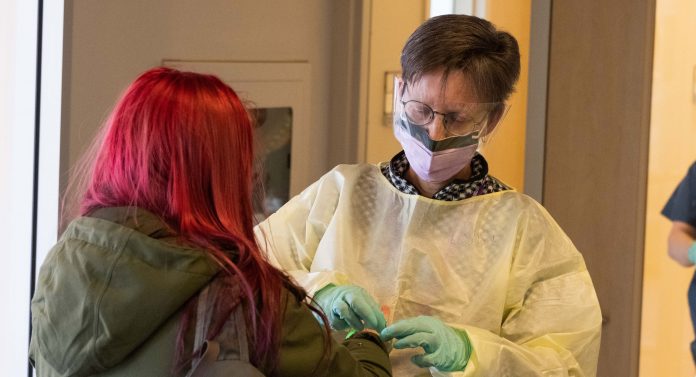The Saskatchewan Health Authority (SHA) announced new proactive measures and precautions to combat COVID-19 and ensure safety in SHA facilities, including new screening and masking requirements for health care providers.
Starting April 15, staff, physicians, learners, trainees, vendors and contractors will be screened daily as they enter any SHA facility or program area to ensure they do not have any influenza like illness. As an added level of protection all staff and physicians who work in patient/client/resident care areas or travel through those areas will be wearing a mask at all times. These measures are being put in place to protect everyone from exposure to, and spread of COVID-19.
“Safety is our top priority,” Saskatchewan Health Authority CEO Scott Livingstone said. “That is why we continue to escalate our efforts to protect our patients and health care providers. Requiring these daily screening practices and adapting our approach to masking will help us stop the spread of COVID-19 and help protect our workforce to ensure our health care services are there when needed.”
The implementation of screening measures will be phased in throughout the SHA facilities including long-term care facilities and programs, including long-term care facilities, hospitals, primary care sites, as well as affiliates working toward a standard of daily screening and temperature checks twice daily consistent with self-monitoring and the most recent health Canada guidelines.
The SHA appreciates the understanding of the public as these additional measures to ensure the safety of our patients and health care workers are implemented in the coming days.
The SHA continues to remind the public that the key variable for saving lives and protecting health care workers is public compliance with isolation measures, physical distancing, effective hand washing and staying home whenever and wherever possible.
Saskatchewan residents can continue to help by taking specific action, including:
• Practicing good hygiene, washing hands regularly and practicing physical distancing (two metres apart wherever possible);
• Taking care of family, friends and neighbours who may be affected by mandatory self-isolation orders;
• Abide by provincial and local travel, self-isolation, event and gathering restrictions;
• Use medical supplies effectively and efficiently so that they are there when needed; and
• Avoid visiting our hospitals and long-term care facilities, unless there are compassionate reasons for doing so.










